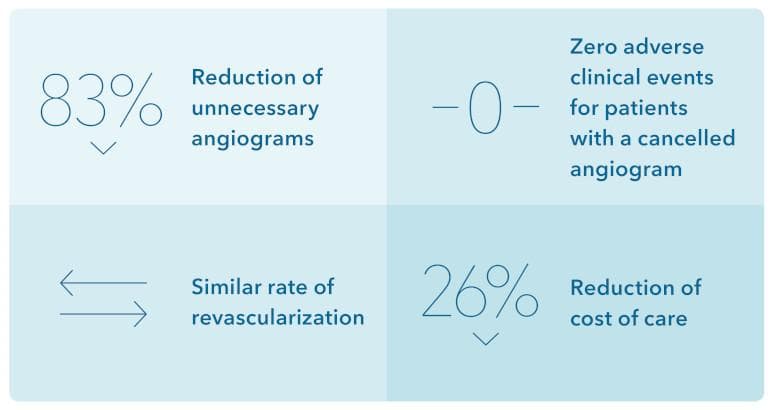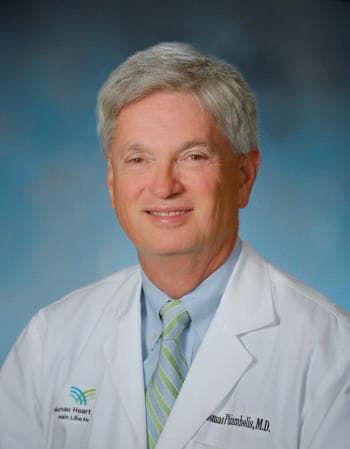Our HeartFlow Analysis is a fundamentally different approach to assessing patients with suspected coronary artery disease. We aim to provide a superior alternative to other testing methods including standard stress testing, such as SPECT and stress echo, that improves outcomes and the patient experience. In validating our approach, we’ve invested decades of scientific research and development, conducted multiple clinical studies, and tested performance in real world settings. This long history of development, including more than 500 peer-reviewed publications, has directly led to growing recognition of the HeartFlow Analysis as an important part of a value-based healthcare system.
Results from studies evaluating more than 10,000 patients demonstrate the impact of the HeartFlow Analysis. The NXT study, which was the basis of our FDA clearance, showed an accuracy of 86% compared to the gold standard of invasive FFR, with high sensitivity and specificity1. The PLATFORM study demonstrated an improved patient experience and reduction of costs, without compromising on clinical outcomes2. PLATFORM results show that, compared to usual care, a pathway of coronary CT and the HeartFlow Analysis resulted in2:

The healthcare community recognizes the potential of the HeartFlow Analysis and the strength of our clinical data. While transitioning to new technologies is never easy, the barriers to adopting HeartFlow are falling. Now, millions of patients will have access to the technology. Here are some of the recent changes:

Dr. Thomas Phiambolis
Director of Cardiac CT Angiography Lankenau Heart Institute
“We knew the HeartFlow Analysis was a game changer for our patients, our hospital and the entire industry. It’s fundamentally changing the way we detect and manage coronary artery disease. We’re investing in this pathway and just purchased two new coronary CT scanners to increase the number of patients we can help. Our radiology department, administrative team, referring community and cardiology division are all involved to make this happen. It’s a coordinated effort, but the results are undeniable — we’re keeping healthy patients out of the cath lab. The HeartFlow Analysis gives us the reason we need to make this change, and it’s happening now.”


$950 reimbursement for Medicare patients
due to the Centers for Medicare & Medicaid Services (CMS) creating a New Technology Ambulatory Payment
Classification (APC) for the HeartFlow Analysis

96% of the US population
now has access to the HeartFlow Analysis through private commercial payers and Medicare

UK reimbursement from the National Health Service (NHS)
as part of their Innovation and Technology Payment program, following a medical technology guidance issued by NICE
recommending the HeartFlow Analysis as the most cost-effective option following a coronary CT
1 Nørgaard BL, et al. Diagnostic performance of non-invasive fractional flow reserve derived from coronary CT angiography in suspected coronary artery disease: The NXT Trial (Analysis of Coronary Blood Flow Using CT Angiography: Next Steps). J Am Coll Cardiol2014;63(12):1145-55.
2 Douglas, et al. Eur Heart J. 2015.




HeartFlow Analysis is consisted of four main functions; FFRCT, Planner, Roadmap, and Plaque. All four functions are cleared for clinical use in the United States, Bahrain, Israel, and United Arab Emirates. Only FFRCT and Planner functions are cleared cleared for clinical use in Europe, United Kingdom, Australia, Canada, and Japan. Please see HeartFlow Analysis Indications for Use and Instructions for Use for more information.
© 2024 HeartFlow, Inc. | HeartFlow and the HeartFlow logo are registered trademarks of HeartFlow, Inc. Additionally, RoadMap is claimed as a trademark of HeartFlow, Inc. www.heartflow.com | 331 E Evelyn Ave, Mountain View, CA 94041
*Required fields
If you would like to request to have the HeartFlow Analysis available at a location near you, please submit your information below with details of the institution. We will share this information with the institution, but it will not guarantee HeartFlow will become available.
*Required fields
オンライン提出フォームから研究助成金を申請してください。
HeartFlow FFRCT 分析は、有資格の臨床医による臨床的に安定した症状のある冠状動脈疾患患者への使用を目的とした個別化された心臓検査です。 HeartFlow Analysis によって提供される情報は、資格のある臨床医が患者の病歴、症状、その他の診断検査、および臨床医の専門的判断と組み合わせて使用することを目的としています。
ハートフロー分析に関する追加の適応情報については、次のサイトをご覧ください。www.heartflow.com/indications.
さらに質問がある場合は、このメッセージを閉じてフォームに記入するか、サポート チームにお電話ください。: 877.478.3569.
The HeartFlow FFRCT Analysis is a personalized cardiac test indicated for use in clinically stable symptomatic patients with coronary artery disease by qualified clinicians. The information provided by the HeartFlow Analysis is intended to be used by qualified clinicians in conjunction with the patient’s history, symptoms, and other diagnostic tests, as well as the clinician’s professional judgement.
For additional indication information about the HeartFlow Analysis, please visit www.heartflow.com/indications.
If you have additional questions, close out of this message to complete our form or call our support team: 877.478.3569.Please use our online submission form on the Clinical Research Page to apply for research grants.
Thank you for your interest!

Executive Vice President and Chief Medical Officer
Campbell brings a wealth of experience to HeartFlow, where he serves as the Chief Medical Officer. Prior to joining HeartFlow, he was the Chief Scientific Officer and Global Head of Research and Development at Cordis Corporation, Johnson & Johnson, where he was responsible for leading investments and research in cardiovascular devices. Prior to Cordis, he was Associate Professor of Medicine at Harvard Medical School and the Harvard-M.I.T. Division of Health Sciences and Technology, and Director of the Cardiac Catheterization and Experimental Cardiovascular Interventional Laboratories at Brigham and Women’s Hospital. He served as Principal Investigator for numerous interventional cardiology device, diagnostic, and pharmacology trials, is the author of numerous journal articles, chapters, and books in the area of coronary artery and other cardiovascular diseases, and was the recipient of research grant awards from the NIH and AHA.
He received his A.B. from Harvard College and his M.D. from Harvard Medical School.